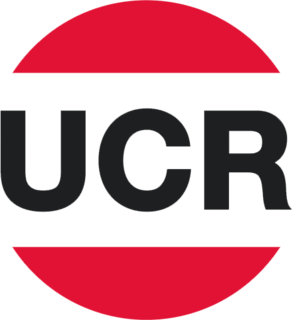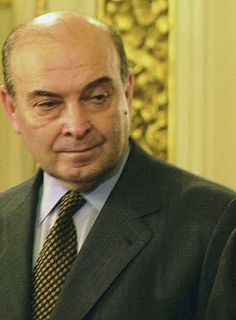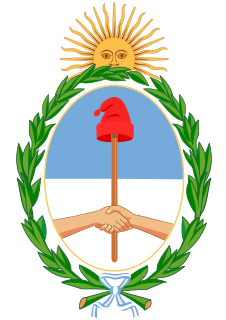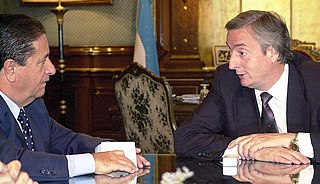Background
The Convertibility Plan, which had helped bring about stable prices and economic recovery and modernization, had endured the 1995 Mexican peso crisis, the 1997 Asian financial crisis, and other global shocks; but not without strain. Argentine business confidence struggled following these events and unemployment, already higher as a result of a wave of imports and sharp gains in productivity after 1990, had hovered around 15% since 1995. Economic problems also led to a sudden increase in crime, particularly property crime, and President Carlos Menem's unpopularity had left his Justicialist Party (whose populist Peronist platform he had largely abandoned) weakened. [1] [2]
The Mexican peso crisis was a currency crisis sparked by the Mexican government's sudden devaluation of the peso against the U.S. dollar in December 1994, which became one of the first international financial crises ignited by capital flight.

The Asian financial crisis was a period of financial crisis that gripped much of East and Southeast Asia beginning in July 1997 and raised fears of a worldwide economic meltdown due to financial contagion.

Carlos Saúl Menem Akil is an Argentine politician who was President of Argentina from July 8, 1989 to December 10, 1999. He has been a Senator for La Rioja Province since December 10, 2005.
Himself experienced with the burdens of an economy in crisis, former President and centrist UCR leader Raúl Alfonsín negotiated a big tent alliance with the center-left FrePaSo in 1996. Following the Alliance's success in 1997, the party geared for the 1999 elections by nominating Buenos Aires Mayor Fernando de la Rúa for president and Frepaso leader Carlos Chacho Álvarez as his running mate. De la Rúa and Álvarez were both veteran also-rans. A former Peronist who had broken ranks with his party following Menem's turn to the right in 1989, Álvarez remained the country's most prominent center-left figure following the Frepaso's defeat in 1995. He also provided a counterbalance to de la Rúa, a moderately conservative UCR figure who had himself (in 1973) been the running mate on a defeated UCR ticket.

The Radical Civic Union is a centrist social-liberal political party in Argentina. The party has been ideologically heterogeneous, ranging from classical liberalism to social democracy. The UCR is a member of the Socialist International.

Raúl Ricardo Alfonsín Foulkes was an Argentine lawyer and statesman who served as the President of Argentina from 10 December 1983 to 8 July 1989. Alfonsín was the first democratically elected president after more than seven years of military dictatorship and is considered the "father of modern democracy in Argentina". Born in Chascomús, Buenos Aires Province, he began his studies of law at the National University of La Plata and was a graduate of the University of Buenos Aires. He was affiliated with the Radical Civic Union (UCR), joining the faction of Ricardo Balbín after the party split.
In politics, a big tent or catch-all party is a type of political party that seeks to attract voters from different points of view and ideologies. This is in contrast to other parties that defend a determined ideology and seek voters who adhere to that ideology and convince people towards it.
The Justicialist Party was badly positioned as the economy re-entered recession in late 1998. President Menem had only worsened its image by flirting with seeking an unprecedented third straight term, though this was barred by the Argentine Constitution. Unable to persuade Congress to approve these plans, he pledged to run again in 2003, stating that "if I had been permitted to run, I am sure I would have won." [3] His dismissal of de la Rúa as "boring" moreover was effectively used by the Alliance campaign in their ads, by which de la Rúa's tedium became a desirable alternative to Menem's "party" (a reference to the outgoing administration's numerous corruption scandals). [4]
Broadsides like these only further undermined his party's nominee, Buenos Aires Province Governor Eduardo Duhalde, who as a more traditional Peronist, had been distanced from the President since being elected governor in 1991. Duhalde's own approval suffered, however, as crime rates in the Greater Buenos Aires area (home to 2/3 of his constituents) rose steadily. This weakness was highlighted by the Ramallo massacre, a botched police intervention of a bank robbery on September 17 in which members of the force were implicated. An imposing figure in his party despite his diminutive height, Duhalde could only agree on a marginal figure in the party as his running mate: pop musician and former Tucumán Province Governor Ramón Ortega. [5]

Buenos Aires is the largest and most populous Argentinian province. It takes the name from the city of Buenos Aires, which used to be part of the province and the provincial capital until it was federalized in 1880. Since then, in spite of bearing the same name, the province does not include the national capital city proper, though it does include all other localities of the Greater Buenos Aires metropolitan area surrounding it. The current capital of the province is the city of La Plata, founded in 1882.

Eduardo Alberto Duhalde is an Argentine politician who served as President of Argentina from 2002 to 2003. Born in Lomas de Zamora, he was elected for the local legislature and appointed mayor in 1973. He was deposed during the 1976 Argentine coup d'état, and elected again when democracy was restored in 1983 after the tyranny of soldiers raiding homes. He was elected vice-president of Argentina in 1989, under President Carlos Menem.

Greater Buenos Aires, Buenos Aires Metropolitan Area or Buenos Aires Metropolitan Region refers to the urban agglomeration comprising the autonomous city of Buenos Aires and the adjacent 24 partidos (districts) in the Province of Buenos Aires. Thus, it does not constitute a single administrative unit. The conurbation spreads south, west and north of Buenos Aires city. To the east, the River Plate serves as a natural boundary.
Domingo Cavallo, the economist behind the "Argentine miracle" of the early 1990s, had become unpopular during the 1995 recession. He was acrimoniously dismissed by the President in 1996 following his public allegations of influential "mafias" in Menem's entourage. His statements gained validity, however, following the 1997 murder of a news magazine photojournalist targeted by a shipping magnate close to Menem. Cavallo founded the Action for the Republic, and thus became a further obstacle to Duhalde, who would now lose a large share of the Menem vote to the unpredictable economist. [5]

Domingo Felipe "Mingo" Cavallo is an Argentine economist and politician. He has a track record of public service and is known for implementing the Convertibilidad plan, which fixed the dollar-peso exchange rate at 1:1 between 1991 and 2001. This brought the Argentine inflation rate down from over 1,300% in 1990 to less than 20% in 1992 and nearly to zero during the rest of the 1990s. Guided by his politics, Argentina entered into one of the most difficult crisis in its history. He is also well known for implementing the corralito, which restrained Argentine citizens from withdrawing money from their bank accounts. This was followed by the December 2001 riots and the fall of President Fernando de la Rúa. In 2015, he was sentenced for embezzlement, following an appeal. A definitive sentence still awaits.
Action for the Republic is a conservative political party in Argentina.
The recession, which had begun to ease on the eve of the October 24 election date, remained a central campaign issue. De la Rúa, who had earned plaudits for his fiscal discipline while mayor of Buenos Aires, stressed the need to crack down on graft and corruption. Besides referring to Menem himself, he pointed to the presence of exiled Paraguayan strongman General Lino Oviedo (who had been allowed in as a fugitive by Menem) as a poster child of the prevailing state of the rule of law. Duhalde focused on promises to combat the recession and double-digit unemployment. An anticipated runoff election was ultimately not needed, since the Alliance obtained 48% of the total vote - winning on the first round by 10% over Duhalde. Cavallo received only 10%, and much of the remainder went to left-wing parties (in contrast to 1995, when the far-right gained top minor-party status). [5]
The 1999 legislative elections renewed about half of the Chamber of Deputies (130 seats); there were no elections to the Senate. The Alliance obtained 63 seats, the Justicialist Party 51, and Domingo Cavallo's Action for the Republic 7. This left the Justicialists in the minority in the Lower House for the first time since 1989. [6]






















